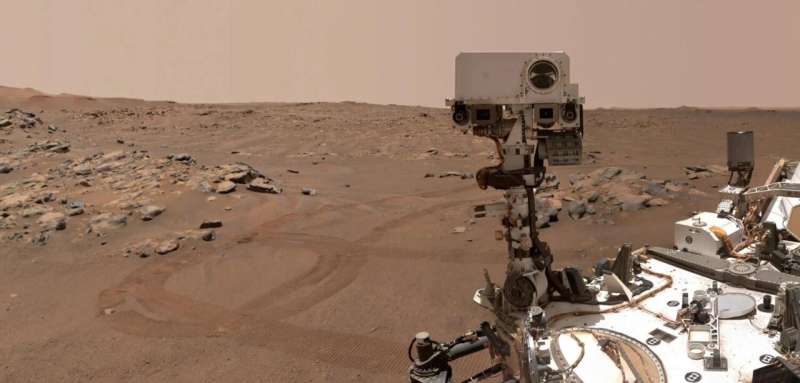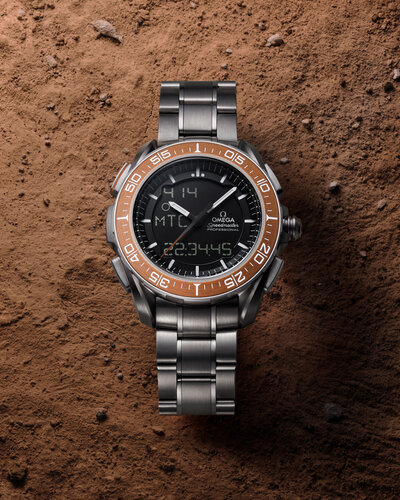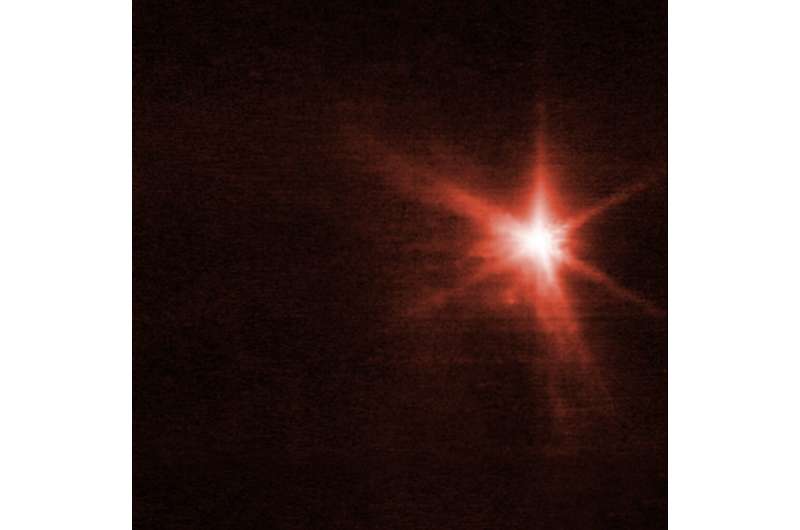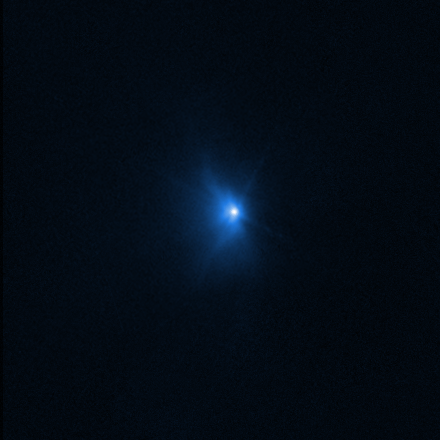
Copernical Team
3 Russian cosmonauts return safely from Intl Space Station
Three Russian cosmonauts touched down Thursday on the steppe of Kazakhstan following a six-month mission on the International Space Station (ISS), Russia's space agency Roscosmos said.
Oleg Artemyev, Denis Matveyev and Sergey Korsakov landed at the scheduled time of 1057 GM, 148 kilometers (91 miles) southeast of the town of Zhezkazgan.
Footage broadcast by Roscosmos showed the cosmonauts being helped from the Soyuz descent module, as they become used to the effects of gravity again.
During their 195 days aboard the station, the crew completed multiple experiments and five space walks, Roscosmos said.
The three-person crew blasted off to the ISS to begin their mission in mid-March, weeks after Moscow sent troops into Ukraine starting what it called a "military operation".
In July, Roscosmos posted a photograph of the trio aboard the ISS holding flags of the Kremlin-backed breakaway Lugansk and Donetsk regions to voice support for Moscow's troops in eastern Ukraine.
Their return to Earth comes as four Moscow-held regions of Ukraine—including Lugansk and Donetsk—call on President Vladimir Putin to formally annex the territories into Russia following hastily organized votes that the West says were a sham.
In response to Russia's military campaign in Ukraine, Western capitals have hit Moscow with unprecedented sanctions, including on the aerospace industry.
Rover findings offer glimpse of Red Planet's ancient landscape

CU Boulder geologist Lisa Mayhew is among the scientists working to recreate the history of an ancient landscape that wouldn't look out of place in Utah—only this terrain sits on Mars millions of miles from Earth.
Mayhew is a member of the science team for NASA's Mars 2020 mission, which is led by the Jet Propulsion Laboratory in southern California. In August, she and her colleagues published some of the first sets of results from the Perseverance rover's exploration of the Red Planet.
The findings take a deep look at Jezero Crater. More than 3 billion years ago, a large asteroid struck Mars, forming this geologic feature that stretches almost 30 miles across and contains rolling sand dunes and craggy cliffs. Using a suite of scientific instruments aboard the Perseverance rover, which is about the size of an SUV, the researchers have begun to explore that landscape's past—showing how igneous rock forms the crater floor and how water reshaped the rocks during a time when a vast lake likely filled this region.
NASA postpones Crew-5 mission over Hurricane Ian
 NASA is shifting the launch date of its Crew-5 mission to the International Space Station in the wake of Hurricane Ian, the space agency confirmed.
"The safety of the crew, ground teams, and hardware are of the utmost importance to NASA and SpaceX," NASA said in a statement on the agency's website.
The launch will now take place no earlier than 12 p.m. EDT on Wednesday, Oct. 5. A
NASA is shifting the launch date of its Crew-5 mission to the International Space Station in the wake of Hurricane Ian, the space agency confirmed.
"The safety of the crew, ground teams, and hardware are of the utmost importance to NASA and SpaceX," NASA said in a statement on the agency's website.
The launch will now take place no earlier than 12 p.m. EDT on Wednesday, Oct. 5. A Potential first traces of the first stars
 Astronomers may have discovered the ancient chemical remains of the first stars to light up the Universe. Using an innovative analysis of a distant quasar observed by the 8.1-meter Gemini North telescope on Hawai'i, operated by NSF's NOIRLab, the scientists found an unusual ratio of elements that, they argue, could only come from the debris produced by the all-consuming explosion of a 300-solar-
Astronomers may have discovered the ancient chemical remains of the first stars to light up the Universe. Using an innovative analysis of a distant quasar observed by the 8.1-meter Gemini North telescope on Hawai'i, operated by NSF's NOIRLab, the scientists found an unusual ratio of elements that, they argue, could only come from the debris produced by the all-consuming explosion of a 300-solar- New asteroid strike images show impact 'a lot bigger than expected'
 The James Webb and Hubble telescopes on Thursday revealed their first images of a spacecraft deliberately smashing into an asteroid, as astronomers indicated that the impact looks to have been much greater than expected.
The world's telescopes turned their gaze towards the space rock Dimorphos earlier this week for a historic test of Earth's ability to defend itself against a potential life-
The James Webb and Hubble telescopes on Thursday revealed their first images of a spacecraft deliberately smashing into an asteroid, as astronomers indicated that the impact looks to have been much greater than expected.
The world's telescopes turned their gaze towards the space rock Dimorphos earlier this week for a historic test of Earth's ability to defend itself against a potential life- Testing time for Mars

Swiss watch brand Omega has teamed up with ESA to launch the Marstimer: the first watch to display the time on Earth and Mars. Developed in partnership with ESA’s Mars exploration teams and tested at ESA ESTEC, this new watch is space-tough and Mars-mission ready.
First images of asteroid strike from Webb, Hubble telescopes

The James Webb and Hubble telescopes on Thursday revealed their initial images of a spacecraft deliberately crashing into an asteroid, marking the first time the two most powerful space telescopes have observed the same celestial object.
The world's telescopes turned their gaze towards the space rock Dimorphos earlier this week for a historic test of Earth's ability to defend itself against a potential future life-threatening asteroid.
Astronomers rejoiced as NASA's Double Asteroid Redirection Test (DART) impactor slammed into its pyramid-sized target 11 million kilometers (6.8 million miles) from Earth on Monday night.
Images taken by Earth-bound telescopes showed a vast cloud of dust expanding out of Dimorphos—and its big brother Didymos which it orbits—after the spacecraft hit.
Three Russian cosmonauts return from space station
Three Russian cosmonauts touched down Thursday on the steppe of Kazakhstan following a six-month mission on the International Space Station (ISS), Russia's space agency Roscosmos said.
Oleg Artemyev, Denis Matveyev and Sergey Korsakov landed at the scheduled time of 1057 GM, 148 kilometers (91 miles) southeast of the town of Zhezkazgan.
Footage broadcast by Roscosmos showed the cosmonauts being helped from the Soyuz descent module, as they become used to the effects of gravity again.
During their 195 days aboard the station, the crew completed multiple experiments and five space walks, Roscosmos said.
The three-person crew blasted off to the ISS to begin their mission in mid-March, weeks after Moscow sent troops into Ukraine starting what it called a "military operation".
In July, Roscosmos posted a photograph of the trio aboard the ISS holding flags of the Kremlin-backed breakaway Lugansk and Donetsk regions to voice support for Moscow's troops in eastern Ukraine.
Their return to Earth comes as four Moscow-held regions of Ukraine—including Lugansk and Donetsk—call on President Vladimir Putin to formally annex the territories into Russia following hastily organized votes that the West says were a sham.
In response to Russia's military campaign in Ukraine, Western capitals have hit Moscow with unprecedented sanctions, including on the aerospace industry.
Webb and Hubble capture detailed views of DART impact

Two of the great space observatories, the NASA/ESA/CSA James Webb Space Telescope and the NASA/ESA Hubble Space Telescope, have captured views of a unique experiment to smash a spacecraft into a small asteroid. Observations of NASA’s Double Asteroid Redirection Test (DART) impact mark the first time that Webb and Hubble were used to simultaneously observe the same celestial target.
Satellogic joins GREEN+ Jurisdictional Program to monitor subnational protected areas
 Satellogic has announced a contract to monitor all subnational protected areas on the planet through the new GREEN+ Jurisdictional Programme. The provision of reliable and consistent high-quality satellite data will be governed by the CC35 Capital Cities Secretariat, the Global Footprint Network and The Energy Coalition, among other respected stakeholders committed to conserving the Earth's "las
Satellogic has announced a contract to monitor all subnational protected areas on the planet through the new GREEN+ Jurisdictional Programme. The provision of reliable and consistent high-quality satellite data will be governed by the CC35 Capital Cities Secretariat, the Global Footprint Network and The Energy Coalition, among other respected stakeholders committed to conserving the Earth's "las 































